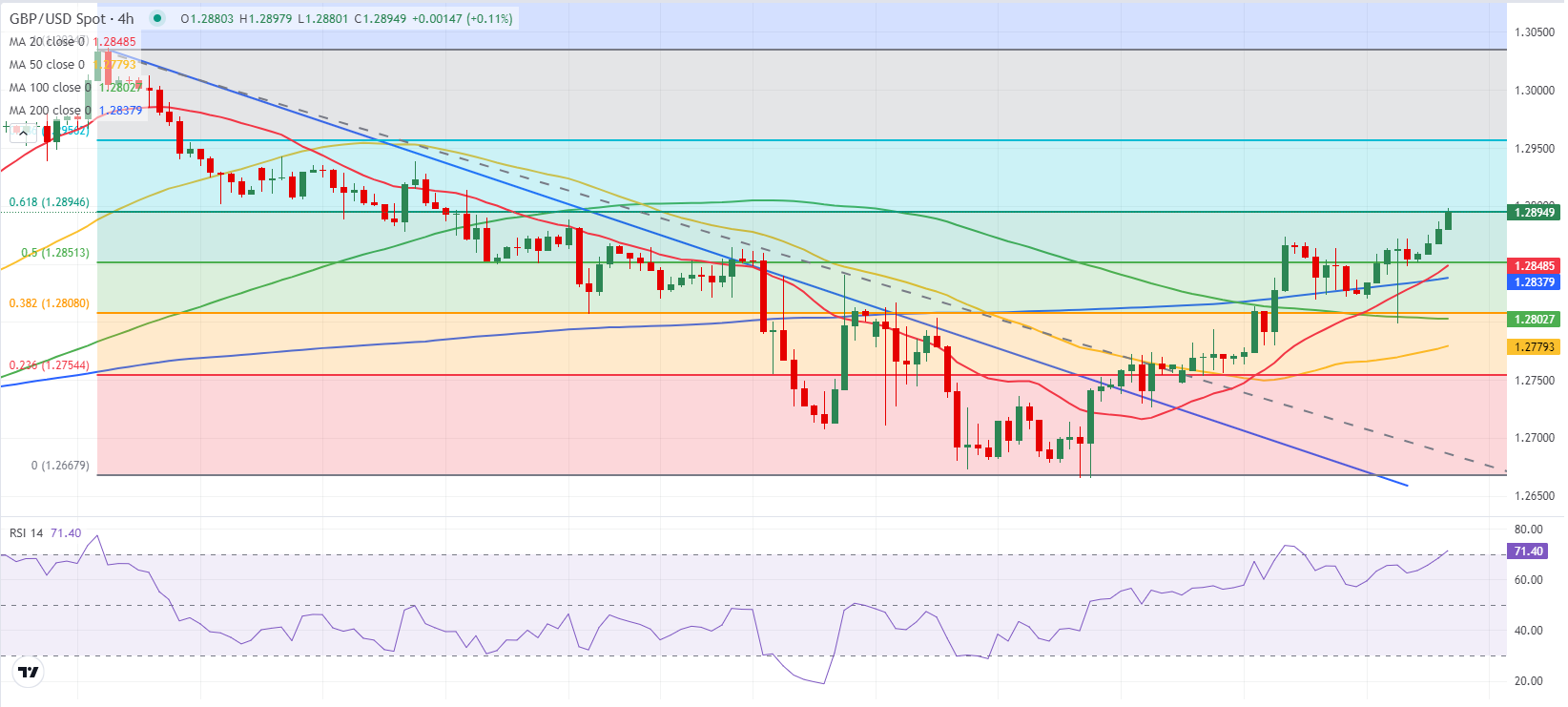Pound Sterling could extend uptrend if it flips 1.2900 into support

- GBP/USD trades at its highest level in three weeks on Friday.
- Technical buyers could remain interested in case the pair clears 1.2900.
- The risk perception could drive the US Dollar’s valuation in the absence of high-impact data releases.
GBP/USD preserves its bullish momentum and trades at its highest level in three weeks slightly below 1.2900 in the European session on Friday. In the absence of high-impact data releases, the risk perception could impact the pair’s action in the second half of the day.
British Pound PRICE This week
The table below shows the percentage change of British Pound (GBP) against listed major currencies this week. British Pound was the strongest against the Japanese Yen.
| USD | EUR | GBP | JPY | CAD | AUD | NZD | CHF | |
|---|---|---|---|---|---|---|---|---|
| USD | -0.63% | -1.04% | 1.40% | -0.14% | -0.95% | -0.36% | 0.47% | |
| EUR | 0.63% | -0.38% | 2.03% | 0.49% | -0.43% | 0.27% | 1.14% | |
| GBP | 1.04% | 0.38% | 2.68% | 0.88% | -0.05% | 0.65% | 1.52% | |
| JPY | -1.40% | -2.03% | -2.68% | -1.50% | -2.38% | -1.74% | -0.94% | |
| CAD | 0.14% | -0.49% | -0.88% | 1.50% | -0.86% | -0.22% | 0.62% | |
| AUD | 0.95% | 0.43% | 0.05% | 2.38% | 0.86% | 0.70% | 1.55% | |
| NZD | 0.36% | -0.27% | -0.65% | 1.74% | 0.22% | -0.70% | 0.86% | |
| CHF | -0.47% | -1.14% | -1.52% | 0.94% | -0.62% | -1.55% | -0.86% |
The heat map shows percentage changes of major currencies against each other. The base currency is picked from the left column, while the quote currency is picked from the top row. For example, if you pick the British Pound from the left column and move along the horizontal line to the US Dollar, the percentage change displayed in the box will represent GBP (base)/USD (quote).
On Thursday, the data from the US showed that the weekly Initial Jobless Claims declined by 7,000 to 227,000. Additionally, Retail Sales rose by 1% in July, surpassing the market expectation for an increase of 0.3%. Upbeat data releases provided a boost to the USD and caused GBP/USD to edge lower toward 1.2800.
As risk flows started to dominate the financial markets following the Wall Street’s opening bell on Thursday, however, GBP/USD regained its traction and closed the day in positive territory.
July Housing Starts and Building Permits data will be featured in the US economic calendar alongside the University of Michigan’s preliminary Consumer Sentiment Index for August. Investors are likely to ignore these figures and stay focused on the risk perception.
At the time of press, US stock index futures were up between 0.15% and 0.3%. A bullish opening in Wall Street could hurt the USD and allow GBP/USD to stretch higher. It’s also worth mentioning that profit-taking and week-end flows could cause inter-market correlations to weaken heading into the weekend.
GBP/USD Technical Analysis
1.2900 (Fibonacci 61.8% retracement of the latest downtrend) aligns as immediate resistance before 1.2950 (Fibonacci 78.6% retracement) and 1.3000 (psychological level, static level).
On the downside, first support is located at 1.2850-1.2840 (Fibonacci 50% retracement, 200-period Simple Moving Average (SMA)) ahead of 1.2800 (100-period SMA, Fibonacci 38.2% retracement) and 1.2760 (Fibonacci 23.6% retracement).
Pound Sterling FAQs
The Pound Sterling (GBP) is the oldest currency in the world (886 AD) and the official currency of the United Kingdom. It is the fourth most traded unit for foreign exchange (FX) in the world, accounting for 12% of all transactions, averaging $630 billion a day, according to 2022 data. Its key trading pairs are GBP/USD, aka ‘Cable’, which accounts for 11% of FX, GBP/JPY, or the ‘Dragon’ as it is known by traders (3%), and EUR/GBP (2%). The Pound Sterling is issued by the Bank of England (BoE).
The single most important factor influencing the value of the Pound Sterling is monetary policy decided by the Bank of England. The BoE bases its decisions on whether it has achieved its primary goal of “price stability” – a steady inflation rate of around 2%. Its primary tool for achieving this is the adjustment of interest rates. When inflation is too high, the BoE will try to rein it in by raising interest rates, making it more expensive for people and businesses to access credit. This is generally positive for GBP, as higher interest rates make the UK a more attractive place for global investors to park their money. When inflation falls too low it is a sign economic growth is slowing. In this scenario, the BoE will consider lowering interest rates to cheapen credit so businesses will borrow more to invest in growth-generating projects.
Data releases gauge the health of the economy and can impact the value of the Pound Sterling. Indicators such as GDP, Manufacturing and Services PMIs, and employment can all influence the direction of the GBP. A strong economy is good for Sterling. Not only does it attract more foreign investment but it may encourage the BoE to put up interest rates, which will directly strengthen GBP. Otherwise, if economic data is weak, the Pound Sterling is likely to fall.
Another significant data release for the Pound Sterling is the Trade Balance. This indicator measures the difference between what a country earns from its exports and what it spends on imports over a given period. If a country produces highly sought-after exports, its currency will benefit purely from the extra demand created from foreign buyers seeking to purchase these goods. Therefore, a positive net Trade Balance strengthens a currency and vice versa for a negative balance.
Source link






